Palmer L.R. The Greek Language
Подождите немного. Документ загружается.

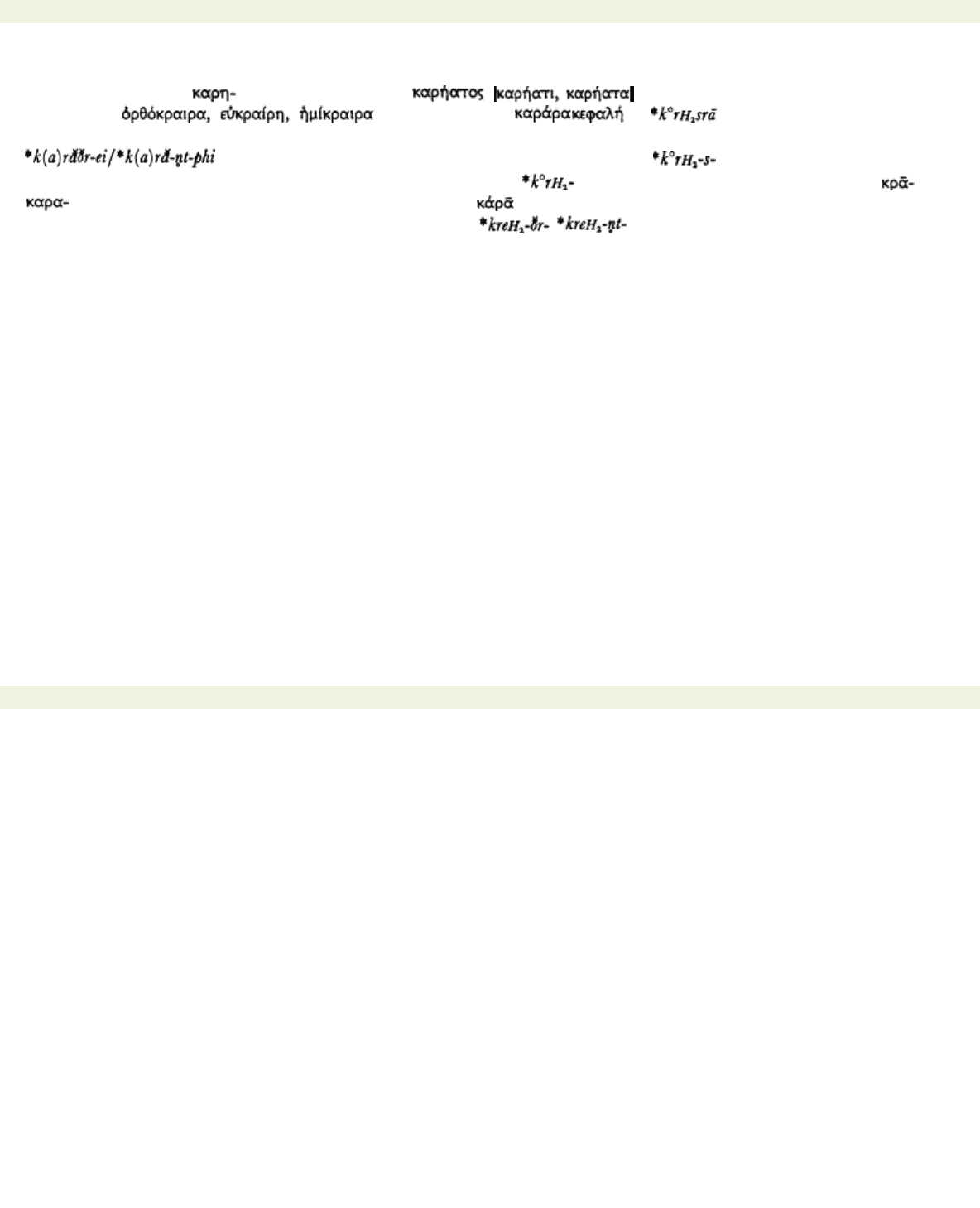
< previous page page_279 next page >
Page 279
the nominative stem
has been introduced: , , etc. An r-stem appears in the
compounds
, and in the gloss (< ). Mycenaean, too, presents
compounds with r-stem: the instrumental singular -karaore, instrumental plural -karaapi, which reflect
. The Linear B spelling tells against the assumption of since we should expect ka-
ra-a2-pi. The underlying base must therefore be *krreH2- or
. This would give rise to a declension /
, and this opens the possibility that the nominative is due to a levelling within this declension. As the
second element of the compound we thus have the stem / , with feminine formations *kreH2-r-
jH2, or *kreH2-er-jH2.
Adjectives
The adjectives do not differ declensionally from the substantives. The category is required primarily to account for
a syntactical phenomenon: the adjective agrees with the noun it qualifies in number, case and gender. Thus the
gender distinctions are the main morphological characteristics of the adjectives. The category is also set up because
the adjectival stems have the peculiarity of combining with certain suffixes which express the 'degrees of
comparison'.
Comparative and Superlative
The Greek comparative stems are formed with suffixes inherited from IE. One is *-jes-/-jos- with a zero grade *-
is-, the suffix being attached directly to roots. Such formations convey the idea that the quality denoted by the
underlying stem is present to an abnormal degree, rather like the English -ish in 'biggish', i.e. rather big, 'too big'.
When the standard of assessment is explicitly mentioned (in Greek with the ablatival genitive; in Latin with the
ablative) the 'comparative' sense 'more than' emerges. In IE the Ablaut alternations of the suffix had the following
distribution within the declension: singular nominative masculine and feminine *-jos, accusative *-jos-m *
(nominative and accusative neuter *-jos), genitive *-jes-os, dative (locative) *-jes-i; plural nominative masculine
and feminine *-jos-es, accusative *-jos-ns* (nominative and accusative neuter
< previous page page_279 next page >
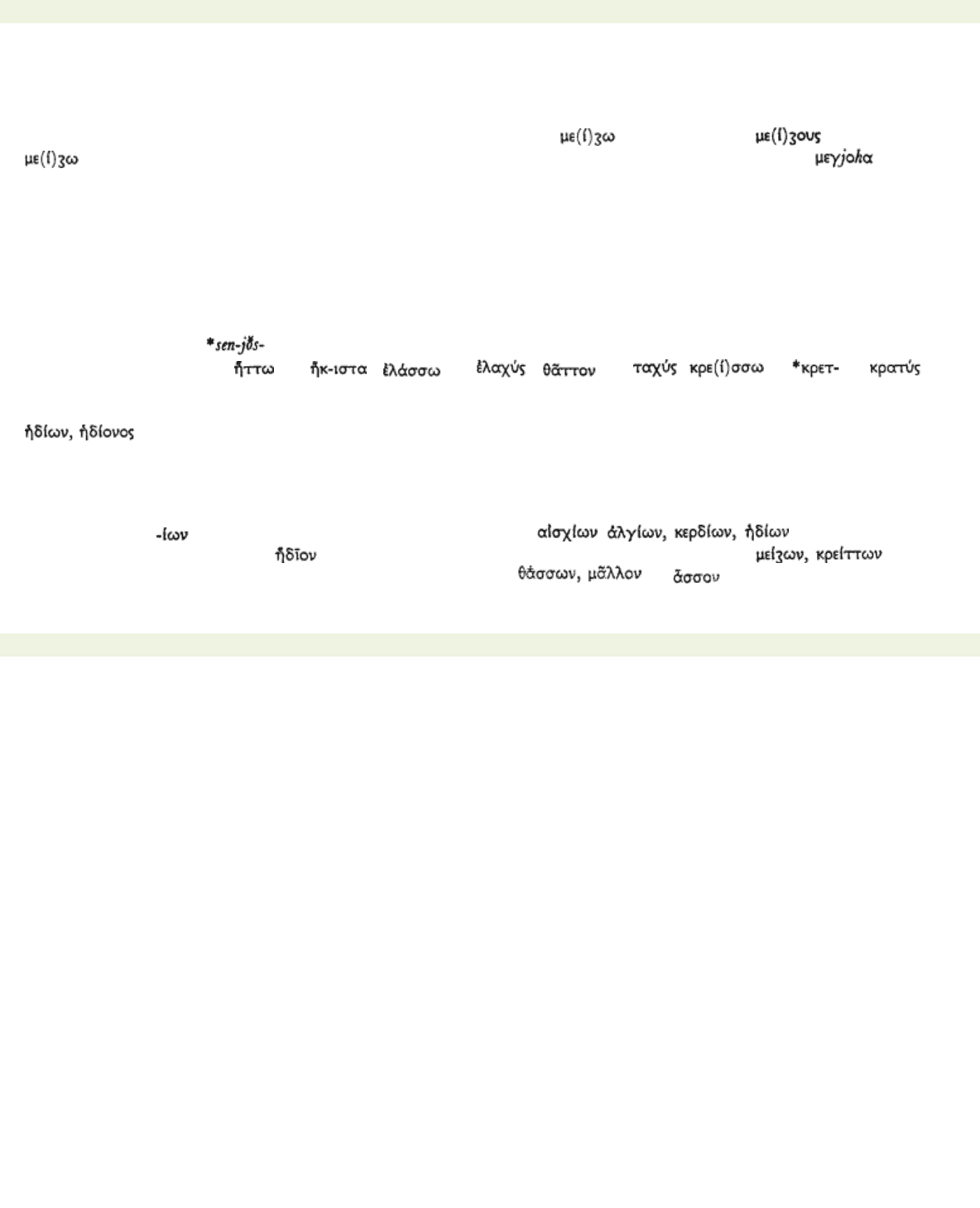
< previous page page_280 next page >
Page 280
*-josH2), but at the earlier stage the weak cases would have had the weak grade *-is- of the suffix, which has
survived in the Latin adverb magis as against neuter maius < *mag-jos. Forms traceable to *-jos-m *, *-jos-es and
*jos-H2 survive as irregularities within the Greek declension: e.g.
< *meg-jos-m*, < *meg-jos-es,
< *meg-jos-H2. Mycenaean confirms the *-s- by the spelling with a2 = ha: e.g. mezoa2 = (p. 47),
but that is its only contribution to our knowledge, since the only forms attested are singular nominative masculine,
feminine, neuter, dual nominative masculine and neuter, plural nominative masculine, feminine, neuter. In
particular the singular nominative form mezo leaves us in the dark about the nature of the final consonant. We have
no means of determining whether the spelling stands for megjos or megjon, and there is no certain evidence for the
oblique cases. The Mycenaean evidence, therefore, provides no basis for the assertion that the declension presented
in alphabetical Greek texts is a post-Mycenaean development.
*-jos- was a primary suffix added directly to the root (the e-grade) and not to the stem of the positive: e.g. Lat.
senior, Skt. sányas- <
. For the phonetic changes caused by 'yodization' of the final consonant of the root,
see p. 225. Examples are: (cf. ), (cf. ), (cf. ), (< cf. ),
etc. It was because of these changes that Greek tended to favour the alternative suffix *-tero- discussed below. In
post-Mycenaean Greek the comparative stem appears in an extended form, nominative -ion-, oblique cases -ion- (
, etc.), which is traced to *-ison-, the first component of this being the zero grade of *-jos-/-jes-
quoted above. The Germanic comparative (Gothic manag-iza, genitive manag-izins, the comparative of manags
'many') (< *-ison/*-isen- offers a parallel which justifies the ascription of the extended suffix to IE.
The form of the suffix varies between -jon and -i(j)on. The alternation reflects a rule of IE syllabification
(Sievers's Law)-
appears mainly after a heavy syllable, e.g. , , etc. In Attic, for
obscure reasons i appears (e.g.
), and there is also lengthening of the root vowel, e.g. .
Lengthening is general in some forms with the root vowel a:
. In (cf.
< previous page page_280 next page >
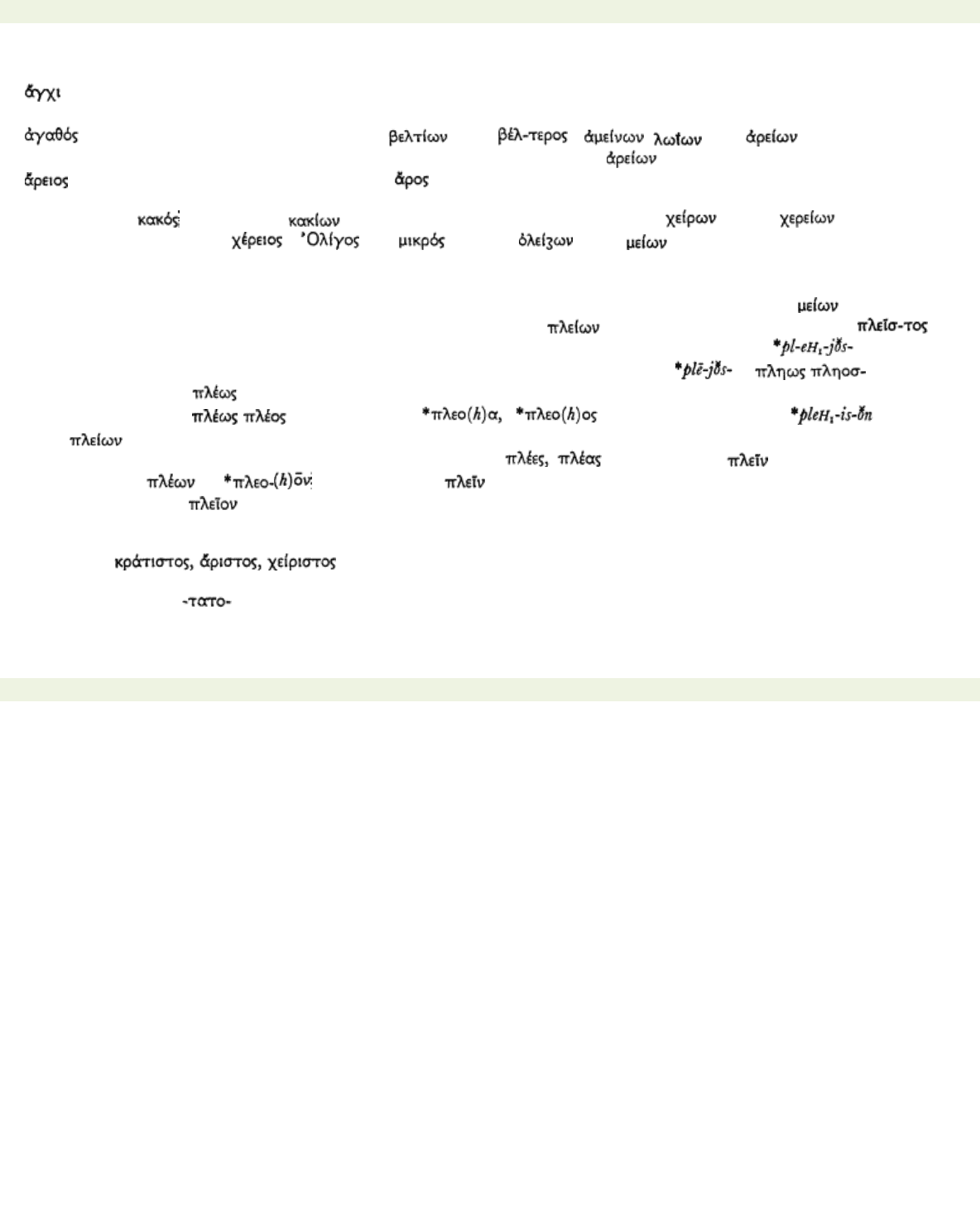
< previous page page_281 next page >
Page 281
the lengthening is due to the loss of n before s: < *ansson < *ankhjon. In a number of adjectives comparative
and superlative stems are 'suppletive', i.e. they are based on a root different from that of the positive. For instance,
'good' has a number of comparatives: (also ), , , and . For the last,
Mycenaean has aro2a = arjo (h)a, and this supports the suggestion that
has been adapted from the positive
, this being a derivative from the s-stem 'benefit'.
The adjective has not only (cf. Myc. kazoe = kakjo(h)es), but also (Horn. , which may
be a refashioned positive ). and , besides , have , which links up with Myc. meujo,
mewijo = meujo(n). Since the root is *mei-/*mi-, the base must have a u-extension: *mei +u-/*mi-eu-/*mi-u- (the
latter with infix nasal yields *minu-, see p. 264); *mj-ew-jos- will, therefore, account for the Mycenaean forms,
u/wi being alternative spellings for the cluster -uj-. Less plausible is the proposal which derives
from *mei-
jos- and ascribes the Mycenaean intrusive -w-to the influence of
. This form, like the superlative ,
connects with the base < *pelH1-/pleH1/plH1-. The comparative is formed from the II form (cf. mj-ew-
jos-), as is confirmed by the Indo-Iranian evidence (Skt. prayas * 'mostly'). This
> / , both
forms yielding Attic
(the first by shortening of h in hiatus and the second by quantitative metathesis). Other
dialects would show
/ with declension , etc. On the other hand would
yield
. Complex phonetic (e.g. hyphaeresis in a succession of three vowels, or contraction) and analogical
processes yielded the manifold Greek forms which include
(Homer), with generalized from
genitive plural (< ) and Attic with , which, however, may be no more than a colloquial
allegro reduction of
.
The superlatives are formed by adding -to- to *-is-, the zero grade of *-jos-, and the root normally has the zero
grade, e.g. , etc.
*-tero-, *-tm-to-* ( ). IE possessed a suffix -tero- which perhaps originated in the addition of the accented
thematic vowel to form adjectives from neuters in -ter. This was a secondary
< previous page page_281 next page >
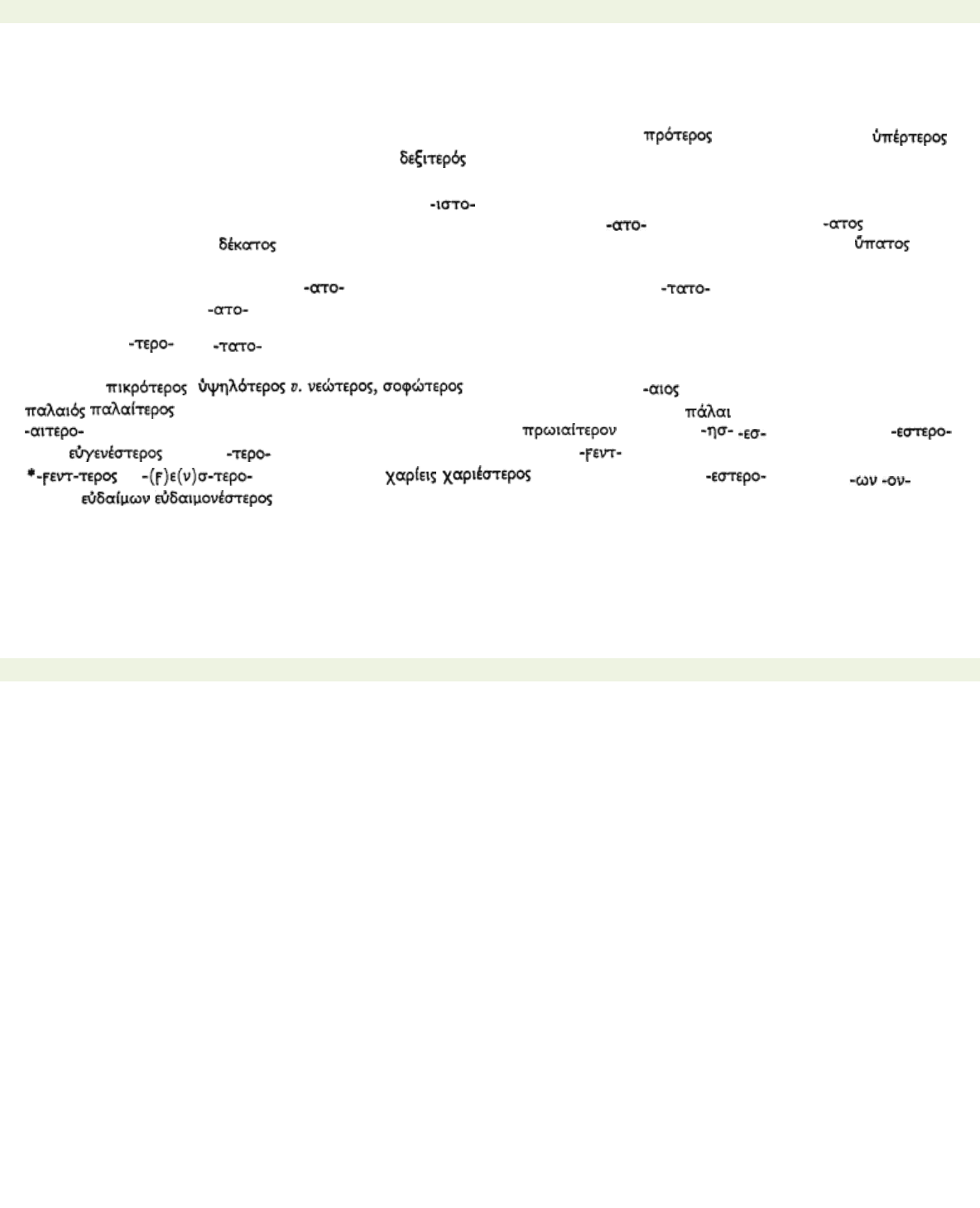
< previous page page_282 next page >
Page 282
suffix attached in the first instance to pronominal and adverbial stems, and this limitation persisted in Italic and
Celtic. Only in Greek and Indo-Iranian did it develop to a regular formant of the comparative. Some of these
formations connect with prepositions, e.g. Skt. ántara (cf. Lat. inter), Greek
(cf. Skt. pratará-), ,
etc. Perhaps from pairs like laevus/ dexter (cf. ) -tero- came to mark the second member of contrasting
pairs (e.g. Lat. alter 'other of two' as against alius), and thence it was specialized as a comparative suffix. The
corresponding superlative also exhibits the -to- of
. The original function of this suffix was to mark the final
stage in a numeration, as in the so-called ordinal numbers (p. 291): e.g.
.1 The extended form originated
in *dekmt-o- * 'tenth' >
and this is found in certain adjectives denoting special extremities, e.g. . The
corresponding Latin suffix is -mo- (summus, imus, etc.), an extended form *-tmo-* being attested in Indo-Iranian
(-tama, cf. Lat.-timus). The suffix
also recurs with a further extension as , which may be an instance of
hypercharacterization,
being added to a form in -to-.
The suffixes and are regularly added to e/o-stems with a prosodic peculiarity: if a light syllable
precedes the thematic vowel of the stem of the positive, the -o- is lengthened to avoid a succession of three light
syllables:
, . Certain adjectives in drop the thematic vowel, e.g.
/ , this originating perhaps in a direct derivation from the adverb . The compound suffix
has spread to certain semantic-ally-related words like . Stems in / regularly have
, e.g. . When is added to the suffix of adjectives in (p. 257), the regular development was
> (p. 241): hence / . The extended suffix spread to /
stems: / and it is found with other stems in non-Attic dialects.
1 So E. Benveniste: This has been challenged by W. Cowgill. In purely descriptive terms, the -to-
adjectives pick out individuals as ordered members of a group: 1, as 'first' and 'last' and 2, within these
extremities (which may have been spatially conceived) as counted members, e.g. 'number three' (see p. 291
on the ordinal numbers).
< previous page page_282 next page >
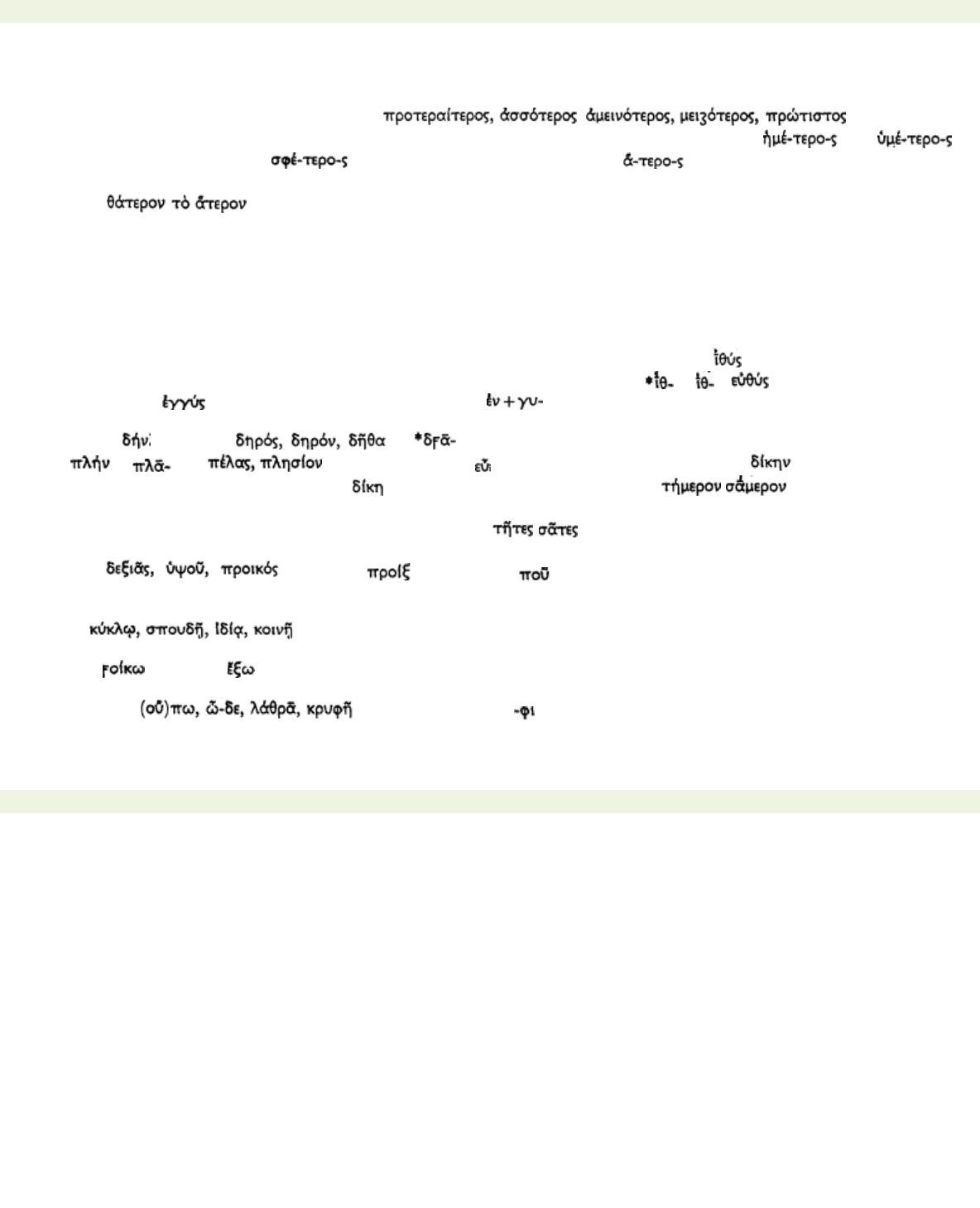
< previous page page_283 next page >
Page 283
Comparatives and superlatives are much prone to the phenomenon of hypercharacterization. Hence the addition of
suffixes to forms already characterized: e.g.
, , etc. The
suffix -tero- (in its original contrastive functions) is also attached to pronominal stems: e.g. and
, < *nsme *, *usme. Similar is (on the stem see p. 288). Finally, (< *sm-tero-s*) is based on the
zero grade of *sem- 'one' (p. 289). The earliest example is Myc. a2tero (weto) = hateron (wetos) 'next year'; cf.
also Attic
/ .
B. Indeclinables: Adverbs and Particles
Most of the noun cases are, from a syntactical point of view, 'adverbial', and a number of Greek adverbs are case
forms which preserve inflexions no longer in declensional use, and sometimes also stems which have otherwise
vanished from the inherited stock.
The nominative (either qualifying the subject or with predicative function) appears in
(cf. Skt. sadhú 'leading to
the goal', 'straight', 'unerring' < *sadh-/sidh- 'reach one's goal', < *siH-dh- >
> ), (of obscure
etymology), and
, which is possibly a compound of , the old word for 'hand'.
Accusative. 'long' (cf. ) < , cf. Skt. duré (locative) 'afar', Hitt. tuwaz 'from afar', Lat. du-
dum; < (cf. < *pelH2/pleH2); (neuter singular) < *esu 'good'; 'in the manner of'
(preserving the earlier meaning 'limit' of
; for the semantics cf. Lat. modo); / 'today' < *kj-
amero-, the first element being the demonstrative stem *ki- (cf. Lat. cis). The extracted element kja- (by false
division) appears in Myc. zawete = kja-wetes 'this year' >
/ .
Genitive. 'gratis' (< < *proik-s); 'where' is often listed as a genitive, but there are
no uncontracted forms and a case inflexion or particle -u must be postulated (see below).
Dative:
, etc.
Ablative: (< *-od), .
Instrumental:
(for examples with see p. 269). Greek -w may go back either to
ablative *-od or
< previous page page_283 next page >
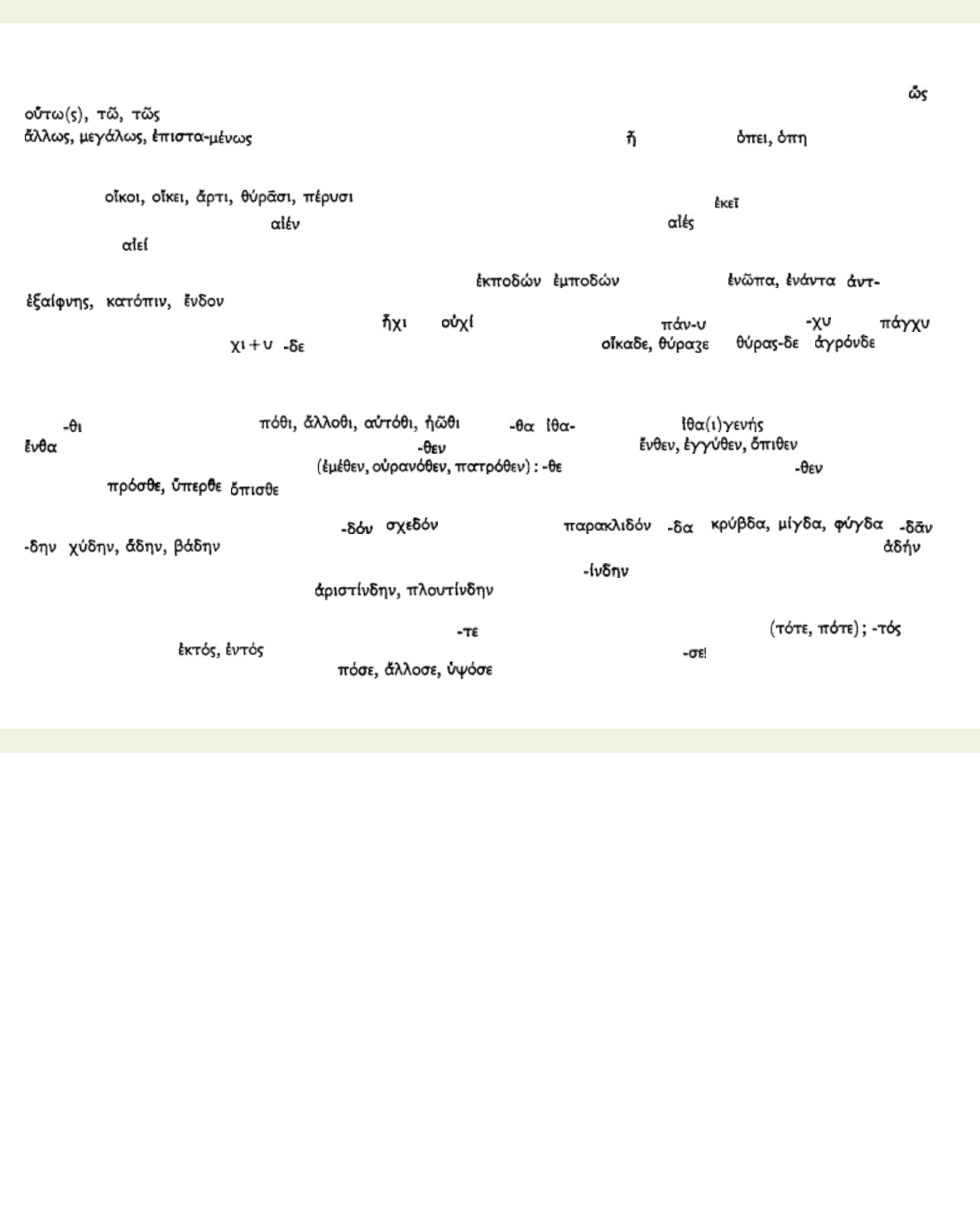
< previous page page_284 next page >
Page 284
the instrumental *-o. It may be extended by -s (possibly genitival). Originating in the pronominal declension (
,
, etc.), it became the regular suffix for the formation of adverbs from adjectives:
, etc. Doric are the old instrumentals in -e like 'where'; for , and Myc. oqe,
see p. 51.
Locative: (< *per+ut-, the zero grade of *wet- 'year'), . The root *aiw- 'life',
'duration', 'permanence' yields
, a locative with zero inflexion of the n-stem; is a similar locative of the s-
stem, while
< *aiwes-i.
The adverbs are sometimes fused prepositional phrases: ( by analogy), ( 'face'),
(*en+*dom 'house'), etc. Other adverbs have the case strengthened with a variety of
particles: e.g. the 'emphatic' particles *-ghi (
, cf. , and Sanskrit hí), *-u ( , cf. Skt. ú); as in
appears to be a fusion of ; strengthens the 'whither' accusative: (= ), ; for
Mycenaean examples, see p. 45.
There are a number of adverbial suffixes which may be survivals of old case-endings. Notable is the group with *-
dh-:
is evidently locatival , as is ( surviving in < *idha, cf. Skt. ihá);
possibly preserves a pronoun *em- or *en-; with ablative function ( ) also figures in the
nominal and pronominal declension
(sometimes alternating with ) is often
locatival (
, ).
Another group has the consonant *-d-:
( 'close at hand', ); ; ( ); /
( ). The last group may be accusatives of stems in -da-, with zero grade of the root; <
*H2es-H2/H2s-eH2-/H2sH2- ''sate with drink'. A compounded form
is used to form adverbs from nouns
denoting distinctions of social class .
Yet another group of suffixes has the consonant *-t-: with the function temporal locative with
ablatival function (
, cf. Skt. -tas in itás 'from here', tátas ' from there'); , with the 'whither' function,
may be due to the assibilation of *-te (
).
< previous page page_284 next page >
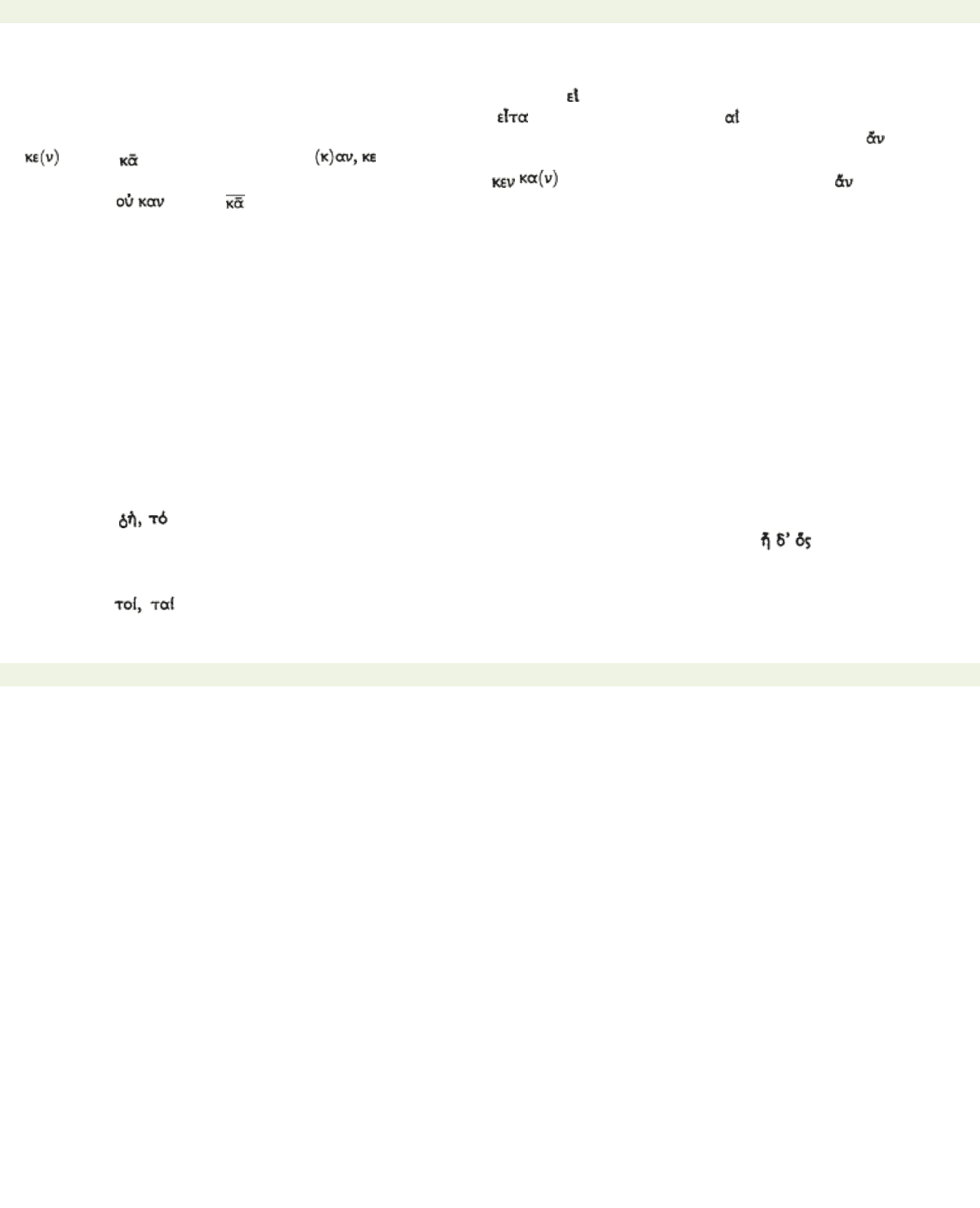
< previous page page_285 next page >
Page 285
There remain a few particles of importance for Greek syntax. Thus
'if' is variously explained as an interjection, or
as the locative of a demonstrative *e-/o- which appears in
. Doric and Aeolic have , which is also interpreted
as an interjection: The 'potential' particle expressing contingency varies according to dialect: Attic-Ionic
, Aeolic
, Doric , and Arcado-Cypriot . These are possibly all adverbial forms of the demonstrative stem k- (p.
286) with the meaning 'in this case': ken/kn * would yield
/ . The latter might be the source of by false
division of
. Doric might go back to an adverbial form *ka. For Mycenaean qe in a 'prospective' sense,
and the possibility that the proto-Greek form was *qwen*/*qwn*, see pp. 67 f.
C. Pronouns
Four groups are distinguished: I, the demonstratives, 2, the interrogative-indefinite, 3, the relatives and 4, the
personal pronouns. In the pronominal declensions some of the case inflexions differ from those of the noun. Within
the declension there is also stem suppletion, e.g. in the demonstrative *so-/ *sa/*to- and in the personal pronouns
*ego/*me. The demonstratives are prone to hypercharacterization, two or more stems often being combined and
deictic particles attached (the 'that there', 'this here' phenomenon). The demonstratives form a deictic system with
three or four oppositions: (a) 'this (near me)', (b) 'that (near you)', (c) 'that (near him)' and (d) 'yon'. In the Latin
system hic/iste/ille, the last combines oppositions (c) and (d).
1. Demonstratives
The so-called article is a post-Homeric development of an old demonstrative nominative *so, *sa, *tod (Skt. sá,
sa*, tád) >
(with loss of -d, an ending which is peculiar to the pro-nominal neuter singular, cf. Lat. is-tud,
quod). The masculine shows the bare stem *so-, but *sos occurs in certain expressions like 'said he'. The
other cases in all genders are formed from to-ta-, and the declension is that of the o- and a-stems, with elimination
of the IE inflexions such as dative *tosmei/ *tosjai/locative *tosmi(u). In the plural nominative *toi/*tas have been
levelled to
, but Attic-Ionic (and certain
< previous page page_285 next page >
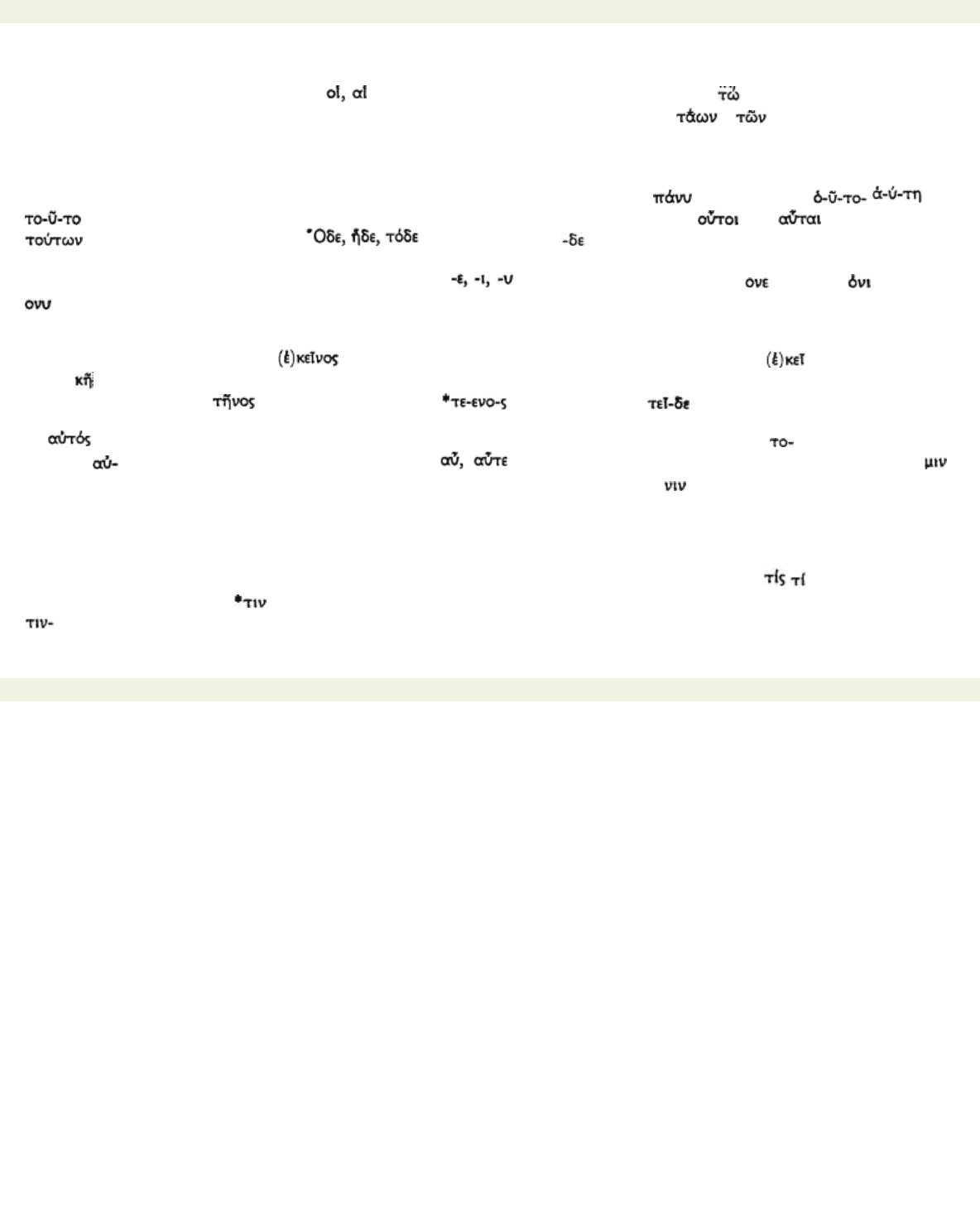
< previous page page_286 next page >
Page 286
other dialects) have changed these to
on the analogy of the singular. In the dual, serves for masculines and
feminines. The genitive plural feminine *tasom (Skt. tasam, cf. Lat. is-tarum) >
> .
The other demonstrative stems are of a complex character. We appear to have simple reduplication in the
Mycenaean toto (weto) 'this year', and this form possibly occurs on an early Attic inscription, but both reading and
interpretation are uncertain. The deictic (or emphatic) element u (cf. above on
) is inserted in / /
. In the nominative plural Attic-Ionic and Lesbian have the analogical forms and . In all dialects
is the form for all genders. have the particle , which is perhaps identical with the
directional particle discussed above. This pronoun is 'ego-deictic', i.e. it denotes proximity to the speaker. Another
demonstrative stem -n-, with added deictic elements
appears in the dialect forms (Thess.), (Arc.),
(Cypr.); the particles -i and -u may possibly once have been in contrast, with the functions of proximal and
distal deixis (for a Skt. particle -au/-u, denoting distance, see Burrow, p. 277).
A particularly complex stem is
'that' in which we detect the stems *ke- (cf. locative , instrumental
Aeol.
; cf. Lat. cedo and cis) and eno- (Hitt. eni-), with a prefix e- (Lat. e-quidem, Osc. e-tanto, and possibly
Skt. a-saú). The Doric
similarly resolves into (cf. Dor., Thess. 'here').
In 'self', which also serves in the oblique cases as the third personal pronoun, the stem is prefixed with an
element , which is perhaps identical with that of , etc. Mycenaean has the anaphoric accusative mi = ,
which is also found in Homer and Herodotus, while Doric has a corresponding
. In both stems the IE *i- (Lat. is,
id, Cypr. lv < *im) has been detected, compounded respectively with a demonstrative stem m- or n-.
2 Interrogative Indefinite
The interrogative pronoun serves also as the indefinite when it is enclitic. *qwis */*qwid* >
/ (Lat. quis, quid).
The accusative *qwim* >
was recharacterized by adding -a of the consonantal stems, and the resulting stem
was generalized
< previous page page_286 next page >
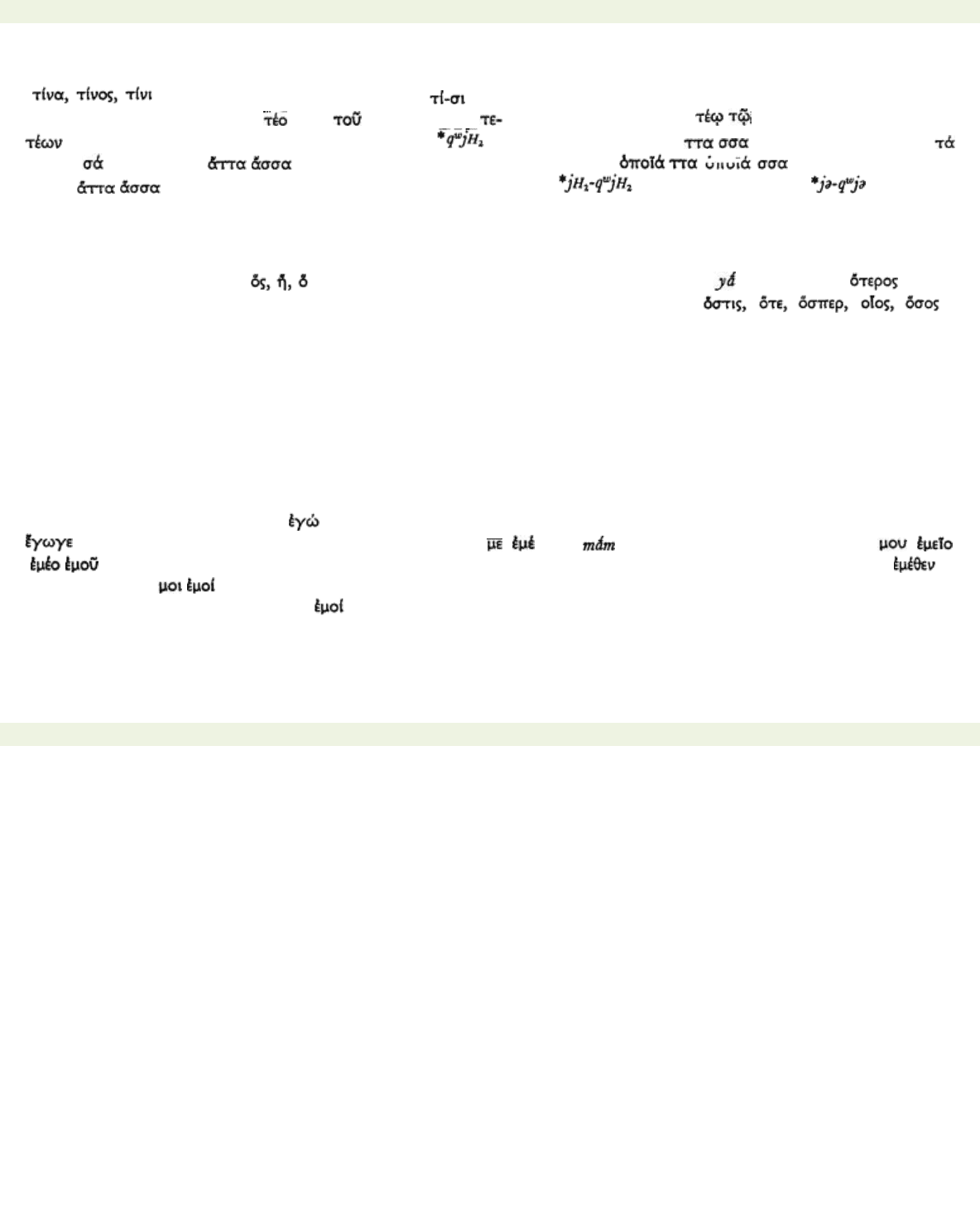
< previous page page_287 next page >
Page 287
(
, etc.), except for the dative plural . In certain cases an e/o-stem appears, e.g. genitive *qwe-sjo
*, which is reflected in Hom.
, Att. , and the stem was extended to dative / and the genitive plural
. The neuter nominative-accusative plural was (cf. Lat. quia), which > / , as reflected in Boeot.
, Meg. . Attic-Ionic / owe their initial vowel to false division / . The aspirated
forms
/ are based on the relative stem *i- (see below): < (in the older notation ).
3. Relative Pronouns
IE possessed thematized forms of the demonstrative *i-: *jos/*ja/*jod, with an originally demonstrative function.
This developed regularly to and was used as a relative pronoun, like Skt. yás, , yád. A form
(Cretan) is also attested, as well as numerous combinations and derivatives, such as .
On Mycenaean jo-, see p. 42.
4. Personal Pronouns
The first and second personal pronouns are in essence deictic; they refer to the person speaking and the person
addressed. There are no gender distinctions, and this is true of IE. The pronoun of the third person is in effect
anaphoric: it stands for a noun previously used in the context and this entails gender distinctions. In the personal
pronouns distinct stems appear in the singular, plural and dual, and in the first person the nominative stem is
different from that of the oblique cases.
First person singular nominative
(Lat. ego) < *ego < *egoH. Strengthening particles may be attached, e.g.
, etc. The oblique cases have the stem *(e)me: acc. / (Skt. /ma, O.Lat. med)< *(e)me; gen. /
/ / , with an inflexion based on that of the o-stems instead of *mene (cf. Skt. máma, Avest. mana; for
see p. 284); dat. / is based on an enclitic form *mei/*moi (cf. Skt. me), which also had genitival functions. In
Greek it gave rise to the tonic form
; elsewhere there are strengthening particles, e.g. Lat. mihi<*me-ghei/-ghi;
cf. also Skt. mahya(m).
First person plural. There is stem suppletion; *wei/- (Skt.
< previous page page_287 next page >
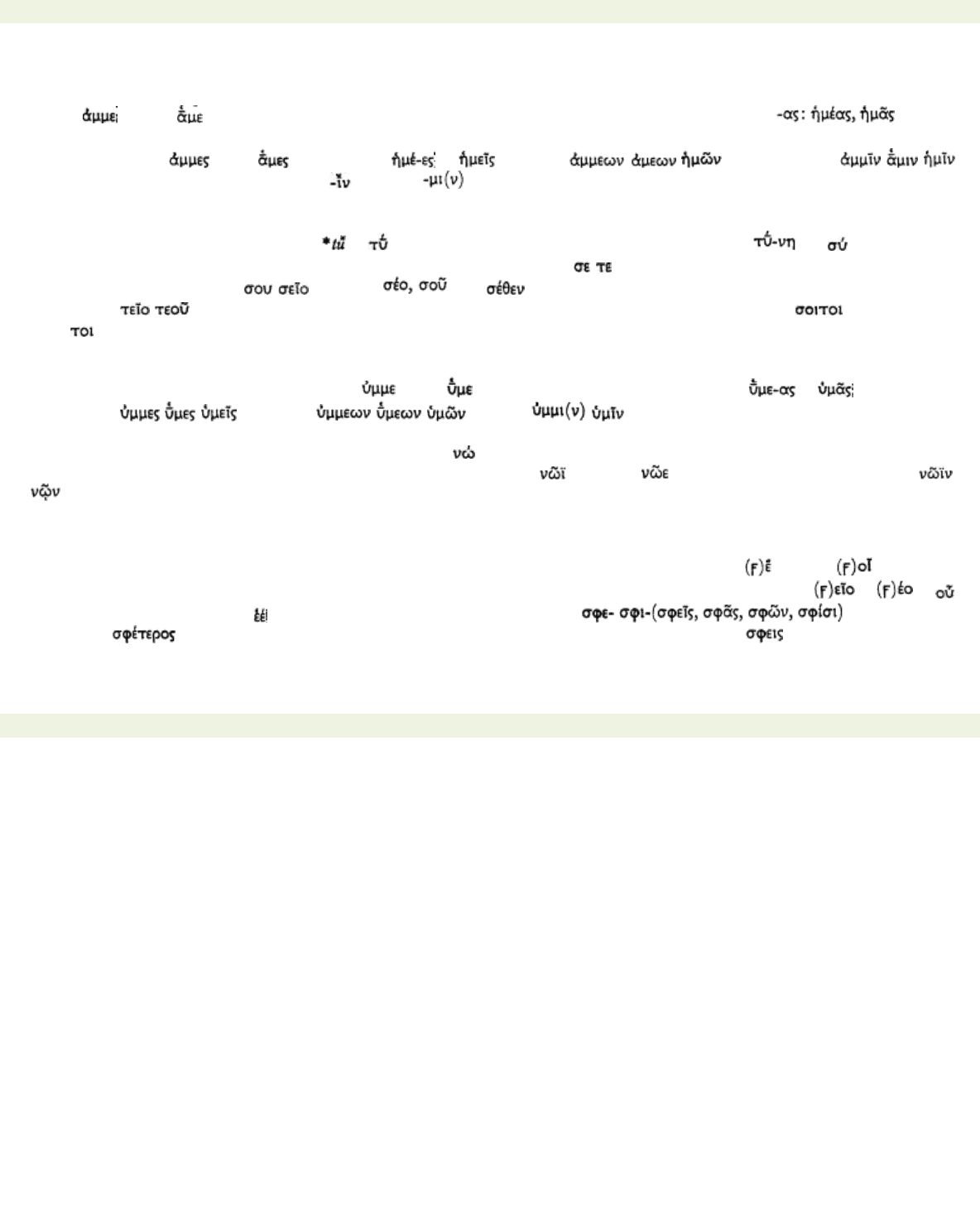
< previous page page_288 next page >
Page 288
rayám, Goth. weis, Hitt. wes)/*ns * (Goth. uns). The latter stem, which appears in the Skt. asma-, accounts for
Aeolic
, Doric , but Attic-Ionic has re-characterized it by the addition of the inflexion . Greek
has generalized *ns* (the full grade appears in Skt. enclitic has, while Lat. has the lengthened form nos):
nominative Aeol.
, Dot. , Attic-Ionic > genitive / / . The dative is / /
, the 'synchronic' inflexion being thus and not IE *nsmei* is posited on the evidence of Vedic asmé, a
locative also used as dative and genitive, this being 'an archaic characteristic' (Burrow, p. 267).
Second person singular. Nominative > (Dor.), with strengthening particle in Homer . In the
assibilation is proper to the oblique stem *tw-: accusative *twe/te >
/ (the latter in Doric as an enclitic), which
forms the basis of genitive / (Horn.), (for see p. 284). The IE genitive tewe/tewo may be
reflected in
/ . There existed an enclitic genitive *i(w)ei/t(w)oi (used also as a dative) > (Skt. te), the
form
surviving as a particle ('mark you') in Attic.
Second person plural. There is no trace of the ancient stem suppletion *jus/wes/wos/us, for Greek has generalized
*us: accusative *us-me regularly.> Aeol.
, Dor. , while Attic-Ionic recharacterizes > . Hence
nominative
/ / , genitive / / , dative / .
The sole pronominal dual stem surviving in Greek is (cf. the enclitic Skt. nau, serving as accusative, genitive
and dative, Avest. na and O.Sl. na), with recharacterized forms
(Horn.), (Corinna) and genitive-dative
/ .
5. The Reflexive Pronoun
The reflexive pronoun of IE had stem alternations *sewe-/swe-/se. The Greek accusative
, dative (the
accented forms being reflexive, and the enclitic anaphoric), < *swe, *swoi, from which a genitive > >
was formed. The accusative (Horn.)<*sewe. The plural has a stem / which also
appears in
, and possibly Myc. pei = sphe(h)i (also interpreted as spheis, cf. Arc. ). It is conceivable
that this originated in the dative
< previous page page_288 next page >
